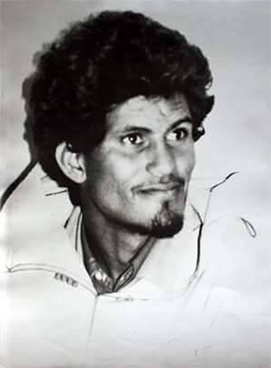El-Ouali Mustapha Sayed facts for kids
Quick facts for kids
El-Ouali Mustapha Sayed
الوالي مصطفى السيد |
|
|---|---|
 |
|
| 1st President of the Sahrawi Republic | |
| In office 29 February 1976 – 9 June 1976 |
|
| Prime Minister | Mohamed Lamine Ould Ahmed |
| Preceded by | Position established |
| Succeeded by | Mohamed Abdelaziz |
| Personal details | |
| Born | 1949 Bir Lehlou, Spanish Sahara, Spanish West Africa or Agyeiyimat, French West Africa |
| Died | 9 June 1976 (aged 26–27) Inchiri Region, Mauritania |
| Political party | POLISARIO |
| Alma mater | Mohammed V University, Rabat, Morocco |
El-Ouali Mustapha Sayed (born 1949 – died June 9, 1976) was an important leader for the Sahrawi people. He helped start the Polisario Front and was its second Secretary-General. The Polisario Front is a group that works for the independence of Western Sahara.
Contents
Early Life and Education
El-Ouali was born in 1949. His family were nomads, meaning they moved from place to place in the desert. He was born in the desert plains of eastern Spanish Sahara or northern Mauritania. Some say he was born in Bir Lehlou, a special place for the Polisario Front.
His family was poor, and his father was disabled. A big drought in the Sahara desert made life even harder. Because of this, his family stopped their traditional nomadic life. They settled near Tan-Tan in southern Morocco in the late 1950s.
El-Ouali went to primary school in Tan-Tan in 1962. He then went to an Islamic Institute in Taroudannt in 1966. He was a very good student and earned scholarships. This allowed him to go to university in Rabat in 1970. There, he studied Law and Political Science. He met other young Sahrawi people who felt strongly about their homeland. He was an excellent student, getting very high marks in Constitutional Law. Around this time, he visited Amsterdam and Paris.
Starting the Polisario Front
El-Ouali was very concerned about Spain's control over Spanish Sahara. He was inspired by the Zemla Intifada, a protest against Spanish rule. In 1972, he returned to Tan-Tan. He started a group called the Embryonic Movement for the Liberation of Saguia el-Hamra and Río de Oro.
After a protest in Tan-Tan in June 1972, El-Ouali and 19 others were arrested. They were also tortured by Moroccan police. After this, he met with other Sahrawi groups from different areas. In 1973, they all came together to create the Polisario Front.
Soon after the Polisario Front was formed, El-Ouali and Brahim Gali led their first armed action. This was the El-Khanga raid on May 20, 1973. They attacked a Spanish military post in the desert. El-Ouali was briefly captured but managed to escape. This attack helped the Polisario Front get weapons and equipment. They then started a full-scale guerrilla war.
In August 1974, El-Ouali became the Secretary-General of the Polisario Front. He took over from Brahim Gali. By 1974-1975, the Polisario Front gained control of much of the desert. Spain was forced to stay in the main coastal cities. The Polisario Front became the most important group fighting for independence.
Leading the Fight for Independence
In late 1975, Morocco and Mauritania invaded Western Sahara. Moroccan planes also attacked Sahrawi refugees in the desert. El-Ouali helped these refugees go to safe camps in Tindouf, Algeria. From there, he led the creation of the Sahrawi Arab Democratic Republic (SADR). This new republic became the government for about 50,000 to 60,000 people in the refugee camps.
The Polisario Front, supported by Algeria and Libya, fought a guerrilla war. They were up against Morocco and Mauritania, who had much larger armies. Polisario fighters often launched raids hundreds of kilometers away. They attacked military posts and economic targets. These included the Bou Craa phosphate conveyor belt and the Zouerat iron mines.
El-Ouali was known for being very inspiring. He often gave speeches in the refugee camps. He also met with foreign journalists to share the Sahrawi struggle with the world. People respected him because he fought alongside his troops on the front lines. This brave choice, however, eventually led to his death.
Death in Battle
On June 9, 1976, El-Ouali was killed during a major Polisario raid. They had attacked Nouakchott, the capital of Mauritania, and bombed the Presidential palace. As they were retreating, Mauritanian troops chased them.
A group with El-Ouali separated from the main column. They went to Benichab, about 100 km north of Nouakchott. Their goal was to destroy the water pipeline that supplied the capital. They were surrounded by Mauritanian troops and defeated. El-Ouali was hit by a piece of shrapnel in the head and died.
His body was taken to Nouakchott and secretly buried in a military area. In 1996, his exact burial place was finally revealed. After his death, Mahfoud Ali Beiba briefly took over as Secretary-General. Then, Mohammed Abdelaziz became the new leader in August 1976.
See also
 In Spanish: El Uali Mustafa Sayed para niños
In Spanish: El Uali Mustafa Sayed para niños
- Polisario Front
- Front Polisario Khat al-Shahid
- Politics of Western Sahara
- Western Sahara War
- Mohamed Ali El Admi
 | William L. Dawson |
 | W. E. B. Du Bois |
 | Harry Belafonte |

